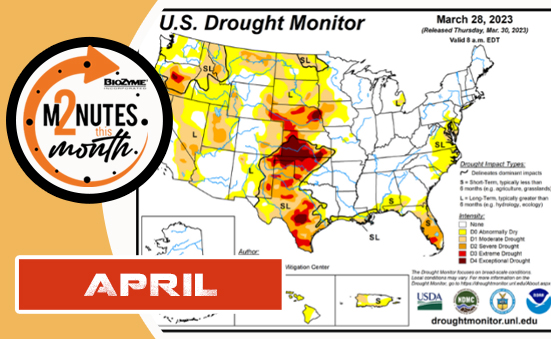By Shelia Grobosky, Content & PR Manager
The adage April showers bring May flowers might need to be changed, depending on the part of the country you are in. According to the U.S. Drought Monitor and colleagues I’ve spoken to recently, April showers would barely settle the dust in parts of Nebraska, Western Kansas, Oklahoma and the northern tip of the Texas Panhandle. Meanwhile, California is facing devastating flooding. The Dakotas are digging out from yet another April blizzard, which means once all the snow finally melts, they will have some green grass AND flowers.
Mother Nature can be brutal, but dealing with her mood swings is part of the risk those of us in agriculture take every day. Spring is officially here, and in my home state of Illinois, when farmers aren’t cleaning up from the recent tornadoes, they are getting equipment ready to start working ground and planting.
Of course crop production has a direct impact on feed prices for all classes of animals, and we are in the nutrition business. The U.S. Department of Agriculture released its Prospective Plantings report on the last day of March that summarizes producers’ planting intentions in the U.S. and reflects expected profitability levels for various crops. Most notably, corn acreage was estimated to increase by roughly 4% from last year – to just under 92 million acres. By comparison, soybean acreage was projected to be virtually unchanged from 2022.
Feed prices are currently high, and significant change is not likely before harvest. Additional corn acres would undoubtedly be seen as a positive from the perspective of livestock feed prices. As long as those additional acres are planted, Mother Nature plays nice this Summer, and harvest is good, producers could see feed prices decrease. If not, remember to use the increased digestibility of AO-Biotics® Amaferm® as a marketing tool to help livestock get the most benefit from the feed producers do have available to them.
Sen. John Thune (R-SD) introduced legislation the first week of April to repeal the federal estate tax, often referred to as the Death Tax. According to a statement from NCBA, “Ensuring a farm or ranch can be passed to children or grandchildren is a priority for family-owned farms, ranches and agricultural businesses. It is critically important that producers and business owners have permanent relief from the Death Tax. Current Death Tax relief is set to expire at the end of 2025, and it is vital that Congress takes immediate action to provide permanent relief for agricultural families.”
